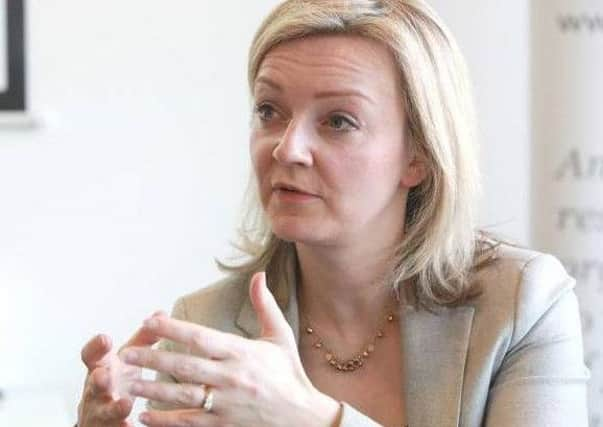Elizabeth Truss: My plan to put farming at heart of the economy


It is the foundation of an industry that is vital to the British economy. The whole food chain employs one in eight people and contributes more than £100bn to the economy. It is our largest manufacturing industry, worth more than cars and aerospace together.
Food businesses weathered the recession well, and have generated more than 200,000 jobs over the past four years I want to lay out our long term economic plan for food and farming – and how we are going to ensure this industry, which is at the heart of the economy, has a bright future.
Advertisement
Hide AdAdvertisement
Hide AdOur plan has four priorities: firstly, enabling a productive and resilient industry; secondly, opening up new markets at home and abroad; thirdly, making EU rules work for us; and finally, protecting this country from plant and animal disease.
We are innovators. Our food producers bring some 16,000 new products a year to the market, more than France and Germany combined. Modern food production needs technical, scientific and management know-how. It is hungry for skilled people; farming alone will need tens of thousands of new people this decade. We are making sure that demand is met.
We are pulling up school standards across the board and increasing the number of apprentices. Last year, 7,000 young people started farming apprenticeships, with a further 3,700 in food manufacturing.
The industry is taking the lead, working to improve skills, setting standards for apprenticeships whether it is in food engineering, horticulture, technology or butchery. It’s all showing results. Colleges report teenagers flocking to courses in farming, food and horticulture. Sheffield Hallam University is offering the country’s first food engineering degree.
Advertisement
Hide AdAdvertisement
Hide AdWe also want to enable the industry to expand. Often when people talk about farm diversification, they mean moving away from food. But it should not have to mean that. We need to build on existing food production, using the qualities of the land and what it produces to add value to whatshoppers buy.
Price volatility is not a one-off storm. It’s going to be a long-term feature of food and farming. No-one is feeling this more keenly than dairy farmers. In the longer term there is going to be increased demand for dairy products, with a growing middle class in Asia in particular.
But I recognise this is scant comfort to those farmers who have seen prices for a litre of milk fall from 33.8 pence at the start of 2014 to the low 20s in some cases now.
That is why we are doing all we can to support those with cash-flow issues and ensure we retain capacity in this sector. Things like working with HMRC on Time to Pay to delay the impact of tax bills. We’re also exploring the idea of extending the tax-averaging period for farmers from two to five years. We are meeting with the banks on a regular basis to ensure that they are providing help where there are short-term cash-flow issues.
Advertisement
Hide AdAdvertisement
Hide AdAlongside this on-farm support, the Government is doing what it can further up the supply chain. We’ve set out the powers of the Grocery Code Adjudicator and she will be able to levy penalties of up to one per cent of UK turnover on buyers who breach the code.
Another part of our plan is to open more markets at home and abroad. We know consumers have a strong desire to buy British. In dairy products alone, we have a £1.3bn trade deficit and we import two thirds of our cheese. We could be producing far, far more of it here. That’s why we are working with the food industry and retailers to remove barriers to local sourcing.
This Government has taken a strong lead in buying more British food – I am pleased that Defra staff now go to work on British, not Danish, bacon.
Selling more of our food abroad is a huge opportunity. Since 2010, exports have grown by more than a billion pounds to nearly £19bn.
Advertisement
Hide AdAdvertisement
Hide AdWe are focusing on those markets that will give the biggest benefits to UK producers; we’re working to open the US beef market, and China is a strategic priority that will be the world’s largest importer of food by 2018. That’s why we have just appointed our first ever food and agriculture counsellor at the embassy in Beijing.
Of course, the EU remains a very important market. I want to see the UK as part of a reformed EU, where we have the benefits of the Single Market, but reduce the burden of red tape and enable our farmers to be more competitive by giving them access to the latest technology. I want a competitive food and farming industry that holds its own in world markets.
This Government believes in food and farming as a core part of our economy and our national life. We are prepared to do what it takes to make sure it has a great future in Britain.
Elizabeth Truss is the Environment Secretary. This is an edited version of her keynote speech to the NFU this week.